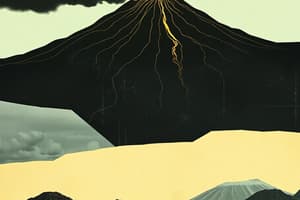Podcast
Questions and Answers
What is the primary cause of earthquakes?
What is the primary cause of earthquakes?
- Meteorite impacts
- Volcanic activity
- Tectonic plate movement (correct)
- Changes in the Earth's orbit
What is the scale used to measure the magnitude of an earthquake?
What is the scale used to measure the magnitude of an earthquake?
- Seismic scale
- Tectonic scale
- Richter scale (correct)
- Mercalli scale
What is the term for a wave caused by the displacement of water, usually as a result of earthquakes or landslides?
What is the term for a wave caused by the displacement of water, usually as a result of earthquakes or landslides?
- Storm surge
- Tsunami (correct)
- Hurricane
- Tidal wave
What is the term for a rotating storm that forms over warm ocean waters, fueled by heat and moisture?
What is the term for a rotating storm that forms over warm ocean waters, fueled by heat and moisture?
What is the term for the release of magma from beneath the Earth's surface through a volcanic vent or fissure?
What is the term for the release of magma from beneath the Earth's surface through a volcanic vent or fissure?
What is the term for a fast-moving, fiery front of flames that can be caused by natural disasters?
What is the term for a fast-moving, fiery front of flames that can be caused by natural disasters?
What is the term for a sudden, violent release of energy in the Earth's crust?
What is the term for a sudden, violent release of energy in the Earth's crust?
What is the term for a storm that forms over warm ocean waters, characterized by strong winds, heavy rainfall, and storm surges?
What is the term for a storm that forms over warm ocean waters, characterized by strong winds, heavy rainfall, and storm surges?
Flashcards are hidden until you start studying
Study Notes
Natural Disasters
Earthquakes
- Caused by the release of energy in the Earth's crust, usually as a result of tectonic plate movement or volcanic activity
- Measured on the Richter scale, which rates the magnitude of the earthquake
- Can cause:
- Ground shaking and damage to buildings and infrastructure
- Landslides and soil liquefaction
- Tsunamis (if the earthquake occurs under the ocean)
- Fires and gas leaks
Hurricanes
- Formed over warm ocean waters, fueled by heat and moisture
- Characterized by strong winds, heavy rainfall, and storm surges
- Classified into five categories based on wind speed:
- Category 1: 74-95 mph
- Category 2: 96-110 mph
- Category 3: 111-129 mph
- Category 4: 130-156 mph
- Category 5: 157 mph or higher
- Can cause:
- Storm surges and coastal flooding
- Heavy rainfall and inland flooding
- Strong winds and damage to buildings and infrastructure
- Power outages and disruptions to essential services
Tsunamis
- Giant ocean waves caused by the displacement of water, usually as a result of earthquakes or landslides
- Can travel at speeds of up to 500 mph and reach heights of over 100 feet
- Can cause:
- Widespread flooding and damage to coastal areas
- Loss of life and property
- Disruption to marine ecosystems and wildlife habitats
Volcanic Eruptions
- Occur when magma from beneath the Earth's surface is released through a volcanic vent or fissure
- Can produce:
- Lava flows, ash clouds, and pyroclastic flows
- Gas emissions and toxic fumes
- Lahars (mudflows) and landslides
- Global cooling and climate disruption
- Classified into several types, including:
- Explosive eruptions (e.g., Mount St. Helens)
- Effusive eruptions (e.g., Kilauea)
Wildfires
- Uncontrolled fires that occur in wildland areas, often sparked by lightning or human activity
- Can cause:
- Loss of life and property
- Environmental damage and ecosystem disruption
- Air and water pollution
- Disruption to essential services and infrastructure
- Factors contributing to wildfires:
- Drought and hot, dry conditions
- Strong winds and weather patterns
- Human activity, such as arson or accidental ignition
Natural Disasters
Earthquakes
- Caused by the release of energy in the Earth's crust due to tectonic plate movement or volcanic activity
- Measured on the Richter scale to rate the magnitude of the earthquake
- Effects include ground shaking, damage to buildings and infrastructure, landslides, soil liquefaction, and tsunamis (if under the ocean)
- Can also cause fires and gas leaks
Hurricanes
- Formed over warm ocean waters, fueled by heat and moisture
- Characterized by strong winds, heavy rainfall, and storm surges
- Classified into five categories based on wind speed, with Category 5 being the strongest (157 mph or higher)
- Can cause storm surges, coastal flooding, heavy rainfall, inland flooding, strong winds, and power outages
Tsunamis
- Giant ocean waves caused by the displacement of water, often due to earthquakes or landslides
- Travel at speeds up to 500 mph and reach heights over 100 feet
- Effects include widespread flooding, loss of life and property, and disruption to marine ecosystems and wildlife habitats
Volcanic Eruptions
- Occur when magma from beneath the Earth's surface is released through a volcanic vent or fissure
- Produce lava flows, ash clouds, pyroclastic flows, gas emissions, and toxic fumes
- Can cause lahars, landslides, global cooling, and climate disruption
- Classified into explosive and effusive eruptions
Wildfires
- Uncontrolled fires in wildland areas, often sparked by lightning or human activity
- Effects include loss of life and property, environmental damage, air and water pollution, and disruption to essential services
- Factors contributing to wildfires include drought, hot and dry conditions, strong winds, and human activity
Studying That Suits You
Use AI to generate personalized quizzes and flashcards to suit your learning preferences.



